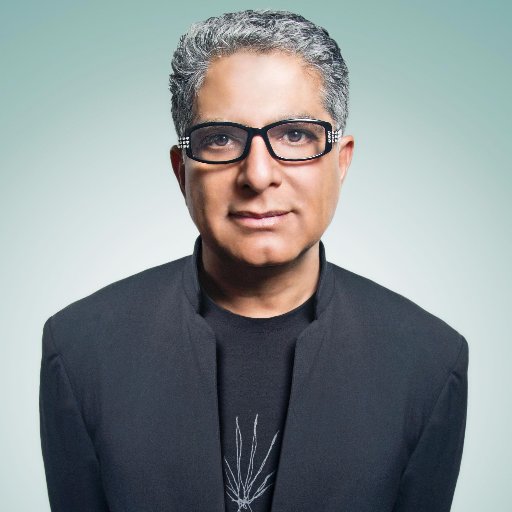Deepak Chopra has long been an advisor to celebrities, politicians and just about everyone else when it comes to self-healing and spirituality. During his book tour for his latest book, The Healing Self: A Revolutionary New Plan to Supercharge Your Immunity and Stay Well for Life, I had the opportunity to speak with him about his new medical discoveries and self-healing advice. He told me about how to deal with chronic health disorders, why we need to talk about the mindbody as a single entity instead of separate the two, his seven day action play for self-healing, how to prevent burnout at work and his best career advice.
Chopra is the founder of the Chopra Foundation, and cofounder of Jiyo.com and the Chopra Center for Wellbeing. TIME magazine has described Dr. Chopra as “One of the top 100 heroes and icons of the century.” Dr. Chopra is Board Certified in Internal Medicine, Endocrinology and Metabolism, and a Fellow of the American College of Physicians. He has written more than 85 books, which have been translated into over forty-three languages.
Dan Schawbel: A third of Americans are suffering from mental health issues like anxiety, stress and depression. Based on the research for your book, what advice would you offer them?
Deepak Chopra: Several things. The major advance in medical knowledge that our book takes advantage of is: 1. Chronic disorders begin years before symptoms show up, 2. Stress, depression, and anxiety may lead to a common root, and 3. The mind-body link enters into almost every serious disorder.
This is good news for understanding disorders before they develop to the stage of showing symptoms, and further good news because self-care can play a big part in finding a strategy for dealing with the linkage between stress and inflammation. Depression, for example, is often associated with poor sleep, anxiety with stress, and both have a high probability of being linked to inflammation (awaiting further research confirmation).
To break the cycle of mild to moderate mood disorders, meditation, good sleep, real stress reduction, a balanced natural-foods diet, minimal to no alcohol, and ending one’s reliance on drugs are a healthy start. But we also know that every depression is probably unique to the person who has it, so it’s definitely a journey to get yourself out of the condition—no one is minimizing the challenge. The journey begins with medical evaluation and best treatment according to what the doctor finds. But ultimately this must be a personal journey that involves deeper self-knowledge and the courage to break out of habitual experiences that trigger negative mental responses on a regular basis.
Schawbel: What was the most surprising thing you discovered while writing this book with Dr. Tanzi?
Chopra: There were many research findings on inflammation and stress that weren’t surprising, because we had been covering them in previous books. I did come to feel, though, that we must finally stop talking about the mind-body connection and instead treat the bodymind as a single entity involved in every life experience. As for one surprising tidbit, I wasn’t prepared for how damaging poor sleep is and how important regular good sleep turns out to be in almost every chronic disorder we looked at, especially for hormonal balance and recovering from daily low-level stress.
Schawbel: You offer a seven-day action plan for self-healing. How did you come up with it and how does it work in practice?
Chopra: Coming up with a plan is what readers naturally want, especially form a book that promises positive changes. We assigned a theme to each day of the week, such as stress or antiinflammation. On that day, there is one list of things to do in terms of lifestyle change and another list of things to undo.
The reader picks only one item and incorporates it into the normal daily routine. Our strategy is to incorporate the easiest changes first and to avoid trying to do too much at once. The biggest problem with conventional prevention is non-compliance. Can you go immediately from a sedentary lifestyle to jogging a mile a day? Few can, and those who try often drop the change because it is too drastic or stick with it for a few weeks or months.
Non-compliance is a coldly clinical term for trying, failing, and getting discouraged. We wanted to show a way to become self-healing by doing things that feel possible and immediately effective.
Schawbel: How can self-healing help prevent the stress and burnout in the workplace?
Chopra: Because modern life is fast-paced and people find it easy to over-schedule themselves, the key is to 1. Avoid putting yourself deliberately into stressful situations, 2. Walk away as soon as possible when you feel pressured or stress, 3. Taking quiet time as soon as possible to center yourself and get control of the stress response through meditation and relaxation, and 4. Weigh the long-term reasons for staying in a stressful job when you should stop enduring it.
The bodymind has enormous powers of adaptation to stressful environments, but over time you have to be decisive and make a choice. Either fix the situation, put up with it, or walk away. Putting up with it, which most people choose first, is actually the worst choice.
Schawbel: What are your top three pieces of career advice?
Chopra:
1. Don’t settle for work that makes you feel stressed, bored, or unfulfilled.
2. Be motivated by your highest vision of yourself, not by doubt and fear.
3. Make personal growth your first priority, not the work you do. Of course, if the two come together, that’s the best of all worlds.


